|
|
|
Sort Order |
|
|
|
Items / Page
|
|
|
|
|
|
|
| Srl | Item |
| 1 |
ID:
106319
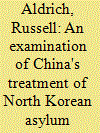

|
|
|
|
|
| Publication |
2011.
|
| Summary/Abstract |
Every year thousands of North Koreans illegally cross into China to escape the abject poverty and oppression that is endemic in their home country, and many are captured by Chinese authorities and returned to their homeland where they face harsh repercussions. To avoid culpability under international law, China maintains that the North Koreans are not refugees but rather "economic migrants," and that therefore they do not qualify for protection under the 1951 United Nations Convention Relating to the Status of Refugees. This paper examines this argument and concludes that it is invalid.
|
|
|
|
|
|
|
|
|
|
|
|
|
|
|
|
| 2 |
ID:
149007
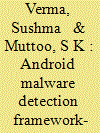

|
|
|
|
|
| Summary/Abstract |
With an exponential growth in smartphone applications targeting useful services such as banks, healthcare, m-commerce, security has become a primary concern. The applications downloaded from unofficial sources pose a security threat as they lack mechanisms for validation of the applications. The malware infected applications may lead to several threats such as leaking user’s private information, enforcing malicious deductions for sending premium SMS, getting root privilege of the android system and so on. Existing anti-viruses depend on signature databases that need to be updated from time to time and are unable to detect zero-day malware. The Android Operating system allows inter-application communication through the use of component reuse by using intents. Unfortunately, message passing is also an application attack surface. A hybrid method for android malware detection by analysing the permissions and intent-filters of the manifest files of the applications is presented. A malware detection framework is developed based on machine learning algorithms and on the basis of the decision tree obtained from ID3 and J48 classifiers available in WEKA. Both algorithms gave same results with an error percentage of 6 per cent. The system improves detection of zero day malware.
|
|
|
|
|
|
|
|
|
|
|
|
|
|
|
|
| 3 |
ID:
146050
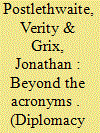

|
|
|
|
|
| Summary/Abstract |
Diplomacy often finds itself reduced to actions centred on states. However, after the Cold War, international relations and diplomacy have expanded with different actors growing into significant roles, particularly in the increase of diplomatic relations in the context of sport. The classification and significance of other actors remains under-researched in relation to sport, with literature focusing more on the growth of new and varying practices of diplomacy. This analysis contends that there is a need to interrogate fundamental components of modern diplomacy—with the actor being the focus—more specifically the classification of sports organisations in diplomacy. It is relevant as a more accurate understanding of sports organisations will contribute to how diplomatic studies can analyse and evaluate modern diplomacy within the context of sport. The International Olympic Committee is the actor used to illustrate how problematic classifications currently in the academic literature translate into weak and reduced analysis and evaluation of its role and significance in diplomacy. As counterpoint, this analysis proposes an analytical framework of socio-legal theory that harnesses legal regulation as a benchmark to classify an actor’s capacity within a society. In consequence, the IOC is as an active and significant contributor to the ever expanding and complex diplomatic environment and wider society.
|
|
|
|
|
|
|
|
|
|
|
|
|
|
|
|
| 4 |
ID:
124820
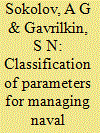

|
|
|
|
|
| Publication |
2013.
|
| Summary/Abstract |
The authors examine management of naval weapons development, put forth a decision-making model, lay out requirements to parameters for managing naval weapons development, suggest a classification of the system of parameters to manage naval weapons development, and offer recommendations for its employment.
|
|
|
|
|
|
|
|
|
|
|
|
|
|
|
|
| 5 |
ID:
042685
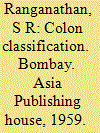

|
|
|
|
|
| Publication |
Bombay, Asia Publishing House, 1959.
|
|
|
|
|
|
|
|
|
|
|
|
Copies: C:1/I:0,R:0,Q:0
Circulation
| Accession# | Call# | Current Location | Status | Policy | Location |
| 000708 | 025.42/RAN 000708 | Main | On Shelf | General | |
|
|
|
|
| 6 |
ID:
114659
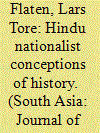

|
|
|
|
|
| Publication |
2012.
|
| Summary/Abstract |
In this article, I seek to examine some key mechanisms underlying the dichotomisation between Hindus and Muslims in Hindu nationalist history writing. Two arguments are central to this study. One is that the strict dichotomisation between Hindus and Muslims presupposes homogeneous categories. This is particularly clear if one examines how Hindu nationalist intellectuals made sense of ambiguities, of individuals and cultural traditions that did not fit directly into the categories, 'Hindus' and 'Muslims'. Moreover, I discuss the role of the so-called hidden 'Others'. I argue that these hidden 'Others' represent, in the form of alternative principles of grouping, the largest obstacle to the Hindu nationalist construction of a Hindu-Muslim dichotomy, both at the political level and within the field of history writing.
|
|
|
|
|
|
|
|
|
|
|
|
|
|
|
|
| 7 |
ID:
138198
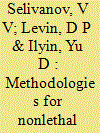

|
|
|
|
|
| Summary/Abstract |
The authors examine the methodological problems facing development of nonlethal weapons (NLW) for delivery to military and police units. They offer a practical approach to the classification of NLW based on physical, chemical, and biological principles and a methodological approach to the development of an NLW targeted program for the Russian Armed Forces and other law enforcement ministries and agencies.
|
|
|
|
|
|
|
|
|
|
|
|
|
|
|
|
| 8 |
ID:
104387
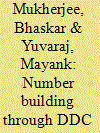

|
|
|
|
|
| Publication |
New Delhi, Alfa Publications, 2010.
|
| Description |
ix, 179p.
|
| Standard Number |
9789380096971, hbk
|
|
|
|
|
|
|
|
|
|
|
|
Copies: C:1/I:0,R:0,Q:0
Circulation
| Accession# | Call# | Current Location | Status | Policy | Location |
| 055987 | 025.431/MUK 055987 | Main | On Shelf | General | |
|
|
|
|
| 9 |
ID:
184798


|
|
|
|
|
| Summary/Abstract |
South Asian collections in the West have complex histories. Usually started at the time of colonial rule and built on practices of acquisition, they often involved the removal of manuscripts and books from the subcontinent with little or no compensation to the owners. This in turn created gaps in knowledge locally. While following the founding of the independent, post-colonial nation-states, acquisition practices changed, a culture of coloniality continued through book exchanges and the classification system rooted in Western frameworks of knowledge and colonial mindsets. Moreover, for scholars outside the physical libraries, there are barriers to access the collections. Looking at current library practices, and with University of Wisconsin-Madison’s collections as a case study, this article outlines some historical problematics and points towards new directions in working toward decolonising the library.
|
|
|
|
|
|
|
|
|
|
|
|
|
|
|
|
| 10 |
ID:
053659
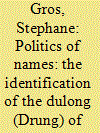

|
|
|
| 11 |
ID:
179224
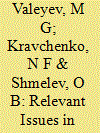

|
|
|
|
|
| Summary/Abstract |
This paper outlines the main problems in the formation of the initial data system covering RF AF facilities, economy, and infrastructure in the interests of organizing aerospace defense, and the methodological approaches to resolving these problems.
|
|
|
|
|
|
|
|
|
|
|
|
|
|
|
|
| 12 |
ID:
193224
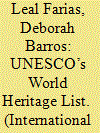

|
|
|
|
|
| Summary/Abstract |
With almost universal membership, the World Heritage Convention is at the heart of the global governance of heritage. Nested within UNESCO, the Convention sets the parameters for determining which natural and/or cultural sites can receive the prestigious ‘World Heritage Property’ designation and be added to the World Heritage List. What started in the early 1970s as an expert-based classification procedure focused on heritage preservation has become an ostensive political process, and a hotbed of competing nations interested in the domestic and international power deriving from inscriptions in the World Heritage List. This paper takes this empirical case as a springboard to reflect upon two key interrelated issues: the politicization of expertise and classification by International Organizations, and heritage as a national identity project and projection of ‘soft power’. In doing so, it highlights how changes in the global system since the late 19th century – for example, colonialism, Cold War, ‘emerging’ powers – affected the global politics of heritage. The paper adds to the incredibly trans-disciplinary field of world heritage research by anchoring itself in International Relations literature, mostly through a Constructivist-based approach.
|
|
|
|
|
|
|
|
|
|
|
|
|
|
|
|
|
|
|
|
|